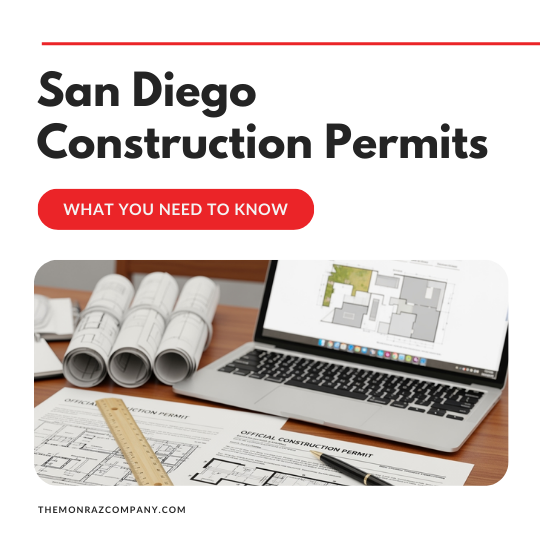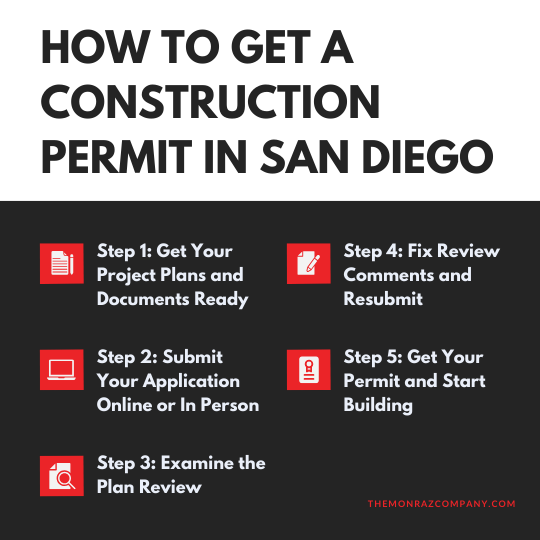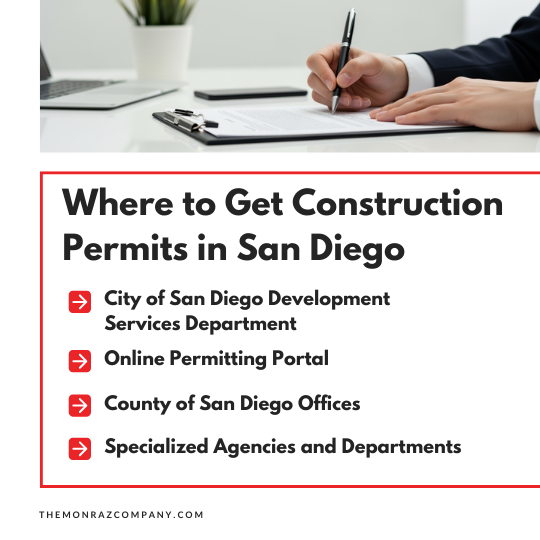San Diego Construction Permits: Key Regulatory Insights
Construction permits, while often viewed as a routine administrative task, are vital for ensuring regulatory compliance. Essentially, they serve as official authorizations that ensure your construction project complies with all applicable safety and building codes. Each state has different, unique requirements—San Diego in particular.
This Southern Californian state has become known for having one of the most thorough permit systems in the U.S. From thorough review standards to subjective considerations, it can be a complex landscape to navigate. That said, knowing the permit steps can save you both time and money.
This guide will provide a comprehensive outline of San Diego’s construction permits, something both property owners and managers should be familiar with. Furthermore, we will share how to get a construction permit in San Diego, as well as where to get it.
Proper permitting in San Diego is often overlooked, but the
experts at TMC understand its importance! Contact us today for any questions or concerns you may have that require professional guidance. We are here to assist, educate, and provide comprehensive support for any of your construction project needs.

What Are San Diego Construction Permits?
San Diego construction permits are formal authorizations necessary for any construction, renovation, or alteration work on a property. These permits are formally issued by the San Diego Development Services Department and ensure all construction projects in the city adhere to local building codes and zoning laws.
Additionally, construction permits fulfill purposes beyond regulatory compliance. They also protect any building investments by ensuring the project aligns with professional standards. Moreover, permits maintain the property’s value and provide legal documentation of project approval. Therefore, if a property owner or manager needs to sell or lease the property, permits demonstrate that your project was completed legally and professionally.
The construction permit system of the City of San Diego is particularly thorough due to the region’s unique topography. Buildings within the area must consider seismic activity, coastal environmental conditions, and crowded urban areas. The extensive approval process ensures all construction projects meet necessary safety and legal requirements.
When Do You Need a Construction Permit in San Diego?
For San Diego construction, a permit is typically required for any work that changes a building’s structure, electrical configuration, or plumbing system. For those unsure whether a permit is necessary, we recommend reaching out directly to the developmental services department. They will be able to efficiently provide you with the answers you need without an extensive wait.
In most cases, obtaining a permit is mandatory for new construction, additions, structural modifications, and changes to a building’s appearance. Permits are also required for alterations to a business’s use or its overall systems. These changes include (but are not limited to) commercial kitchens, offices, stores, dwelling units, and factories. Even minor projects, like light installation or restroom renovations, typically necessitate permits.
For commercial properties, parking lot improvements like
asphalt paving and
concrete construction also require permits. Additionally, these properties must comply with local and federal regulations, including accessibility standards such as
ADA handicap requirements. This not only protects the business but also meets client and customer expectations.
Furthermore, permits are also required for exterior work, such as signage or fence installation, and
striping or sealing work that alters traffic or property lines. This also stands true for projects that modify drainage, fire safety, or HVAC systems. And, finally, you also need permits for temporary structures, demolition work, and changes to existing, pre-approved permits.

How to Get a Construction Permit in San Diego
For efficient construction permit approval, prepare well and pay attention to necessary details. The process may seem tedious, but it’s easier when broken down to these simple steps.
Step 1: Get Your Project Plans and Documents Ready
Your project submittal must include complete design plans, structure calculations, and details that transparently demonstrate any planned work. These permits must be prepared by licensed professionals and follow the city’s Building Permit Template and Requirements for Digital Plans and Documents. After submission, these documents will be reviewed to ensure they follow current building codes. For buildings over 45 years old, additional permits may be necessary.
Some of the forms you may need to complete include:
These forms need to be completed based on the specific projection or renovation.
Step 2: Submit Your Application Online or In Person
San Diego has made the permit process easy with their online portal. However, complex projects might require an in-person meeting. To avoid delays, ensure your submission includes all necessary forms, supporting documentation, and relevant receipts. Applications with incomplete documentation will be rejected, thereby complicating the process.
The permit procedure varies depending on the complexity of the project. Simple developments generally receive quicker approval, whereas more intricate projects undergo a more thorough review. With this in mind, the scope of your proposed development can significantly impact both the timeline and likelihood of permit approval.
Step 3: Examine the Plan Review
Once you submit the request, your plans will then proceed to the plan review phase. This step in the process requires multiple city departments to review different areas of your project. Building officials, for example, will evaluate the structure and code compliance. At the same time, other city departments will assess zoning, fire safety, and environmental protocols.
After reviewing your documentation, the permitting officials might request revisions or additional information. Though this can extend the approval timeline, it is a standard part of the process. Ultimately, it prevents any compliance issues or costly directions in the future.
Step 4: Fix Review Comments and Resubmit
If the reviewers find any problems with your plans, they will leave comments informing you of what needs to be fixed. When reevaluating, it’s important to fix any complications entirely, as partial fixes often lead to repeated submissions. Though the rules may seem meticulous, they are there to ensure your project meets all necessary regulations.
Once you have revised any comments, submit your plans again. Review teams, rather than looking over your entire plan, will just focus on previously marked errors. As a result, this streamlines the process and allows you to receive additional results quickly.
Step 5: Get Your Permit and Start Building
Following plan approval, you will receive authorization for permit issuance and can proceed with obtaining your permits. Most permits have specific rules and inspection requirements that the construction team must follow. Display these permits clearly at the work site as stipulated by law.
Remember, getting a permit doesn't mean you won't face other requirements while building. Building inspectors might find job site problems that weren't clear during the plan review, which could require design changes or additional permits.

Where to Get Construction Permits in San Diego
Knowing where to get your permits and who to work with can impact how efficiently the project goes. At the same time, it can also impact how quickly you are able to complete the project. Here are some of the places to get construction permits in San Diego:
City of San Diego Development Services Department
For most construction permits, you'll want to head to the Development Services Department. They handle all the building permits for projects inside San Diego's city limits. They also manage permits for everything from new houses to improvements on apartments, businesses, factories, and additional structures. Here you can find plan reviewers, building inspectors, and customer service representatives who can assist you with the permit process.
In addition to this, they have different processing methods based on project types and objectives. For example, Rapid Review is available for simple, minor, or low-risk projects. Comparatively, Express Plan Check can accelerate standard submissions for an additional cost, and the Expedite Program prioritizes affordable housing and sustainable development projects with quicker timelines.
Online Permitting Portal
San Diego’s online portal is very beneficial for routine permits. If you're doing something simple, like tenant improvements, installing equipment, or minor modifications, you can submit and get approved online. The system gives you regular status updates, and you can upload your plans electronically.
The online permitting portal is useful for projects with standard designs and clear details. However, for unique or complex projects, in-person consultation helps to ensure you meet all the requirements before you submit.
County of San Diego Offices
If your property is outside San Diego city limits, you'll need permits from the County of San Diego. The county has offices throughout the region, each serving certain areas. Keep in mind, county permit requirements can be different from city requirements, especially in unincorporated regions. Knowing which rules apply to your project is key to avoiding delays and getting the right approvals.
Specialized Agencies and Departments
Some projects require permits or approvals from other agencies besides the primary building department. If you're near the coast, for example, you might need permits from the Coastal Commission. Projects that affect wetlands need approval from environmental agencies, and if you're close to airports, you'll need to follow FAA rules.
Fire department permits are needed for projects like fire suppression systems, storage for hazardous materials, or places where large crowds gather. These specialized permits often run parallel to the central building permit process, and coordination between agencies is essential for project success.
San Diego's construction permit process is easy when done properly.
Navigating San Diego's construction permit process doesn't have to be overwhelming when you understand the system and prepare properly. The key is starting early, working with experienced professionals, and maintaining open communication with the development services team throughout your project.
Remember that permits are an investment in your property's safety, value, and legal compliance. While the process requires time and attention to detail, proper permitting protects you from future liability and ensures your project meets all applicable building codes and regulations.
Whether you're doing a small tenant remodel or major construction, the right contractor can make things easier. At
TMC Engineering, we have the knowledge and experience to help you navigate the building permit process from start to finish.
Ready to begin your construction projects in San Diego?
Contact TMC Engineering today! We can discuss how to handle the permit application and any additional commercial construction needs.




